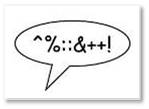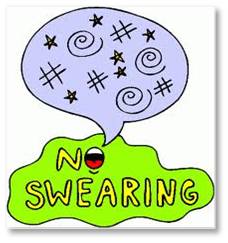Guest Author: Susanne Skinner
It has ceased to be bad language and has simply become language. I’m talking about swearing. Once upon a time swearing out loud was used as emotional punctuation – a word inserted into speech to make a point. Swear words aren’t new, but using them as every day conversation is so prevalent they have become commonplace, especially among young people.
When I was growing up, the word I remember most vividly is damn. It lived in infamy after Rhett Butler turned his back on Scarlett O’Hara with the phrase “Frankly my dear, I don’t give a damn.” It shocked people and opened a door that had been firmly closed in polite circles. In my house, damn was The Bad Word. When my Dad used the word, it meant one of three things:
In my house, damn was The Bad Word. When my Dad used the word, it meant one of three things:
- Something really bad happened
- Something really bad was going to happen
- One of us was in trouble. See 1 and 2.
When President Kennedy was assassinated my dad said, “The world lost a damn fine President.” When we entered our teenage years we also heard “What the hell were you thinking?” I would like to say we didn’t hear it too often but we did. No other swear words were spoken or tolerated. My friends didn’t use swear words, and I never heard their parents swear. I grew up in a pretty tame verbal environment. By the time I got to college swearing was more prolific but there was still a very distinct line between good and bad language. I was careful – saying words that would shock or upset my parents was simply too risky. The more comfortable I became using them, the easier it would be slip up. By the time I became a parent and understood children repeat everything they hear my words were chosen with great care. I can’t claim I never said offensive words, but they did not become everyday nouns, adjectives and verbs woven into my speech. I always knew what I was saying, even when it wasn’t polite.
Intentional Shock
When I was in my early twenties I used a word to intentionally shock my parents, and demonstrate how mature and independent I had become. I did not get the hoped for reaction. My father said, “If that is the most intelligent thing that is going to come out of your mouth, perhaps you should keep it shut.” Dad: One, Me: Zero. I borrowed this line often as we raised our children and it has lost none of its potency.
Fast forward to 2013. I was standing outside a movie theater waiting for friends to join me for an afternoon matinee. The theater is next to a Chili’s restaurant and Cold Stone Creamery. It was a beautiful afternoon and both had outside seating. The tables and sidewalks were filled with young people talking; their sentences liberally populated with swearing and derogatory terms. The words were spoken unselfconsciously and with ease. F-Bombs fell around me like leaves falling from trees. Words I can neither speak nor print were commonplace in their conversations. I heard every word.
I wondered if their parents spoke like that. When did this become the language teens use to speak to one another? When did the N word and the B word become greetings? No one around me seemed offended or surprised. I guess the rules and attitudes about what constitutes bad language have changed. The anonymity of the internet has brought us to the point where anything and everything goes. Profanity has become socially acceptable. Vulgarity is the new norm with racist, sexist and homophobic remarks added for extra effect.
The Power of Words
In Holy Sh*t: A Brief History of Swearing, medieval literature expert Melissa Mohr says by the age of two most children know at least one swear word. By the time they are teens they have become reflections of their environment. Timothy Jay, one of the leading scholars on cursing in the United States, estimates that the average teen uses 80 to 90 swear words a day. He calls it conversational swearing. It has become so common in our media and our culture that what used to sound coarse, harsh and vulgar is now commonplace. Since a swear word can now mean anything, it also means nothing. It’s time to clean it up and rediscover the power of words – good words, intelligent words, clean words.
It’s time to clean it up and rediscover the power of words – good words, intelligent words, clean words.
To the teens out there who are struggling with this concept, let me offer you a peak at your future. As you grown into adulthood you will need good verbal skills. Words matter, and will have a huge impact on how you are perceived. Someone like me is going to interview you for college admission and eventual employment. You will need to impress us instead of your friends. You will need to speak whole sentences without one word of profanity. I challenge you to express yourself without swearing! Parents, please lead by example and establish a zero tolerance in your home.
You’ve got nothing to lose but the #*%@^& language you’ve grown accustomed to.
